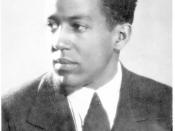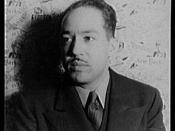Growing up in a time period where African Americans had little rights, Langston Hughes became a poet who had many hopes and aspirations for a better future for all African Americans. He grew up in Harlem and was raised by his grandmother. Being a native of Harlem, he was a very strong influence in the Harlem Renaissance during the 1920's. Langston always stayed true to his African American heritage; his racial pride played a dominant role throughout his life, which is evident in his poems.
Langston's father, James Nathaniel Hughes, was not supportive figure in his son's life. James was also Milado, but he did not share the same pride in which Langston lived his life. In fact, he hated his black heritage, and was very much against Langston expressing his pride through poetry and writings. James disapproved of his son being a writer. It was very difficult for him to handle the fact that his son had so much pride in something that he was so against.
His hopes were that Langston would be a businessman, figuring that would the only way in which a black person could make it.
Throughout his poems, Langston discusses his hopes for a better future for all African Americans. In one of his earlier poems, I Too, he looks for a future respect from others. This hope for a better future is evident through his word choice. He uses words such as "tomorrow" to symbolize the future. In the poem, I Too, he writes: Sisson-2 "Tomorrow, I'll be at the table When company comes.
Nobody'll dare Say to me, "Eat in the Kitchen," Then." This entire quote is his way of looking to the future, a future of equal rights and respect. In the beginning of his career, he was young and very...


